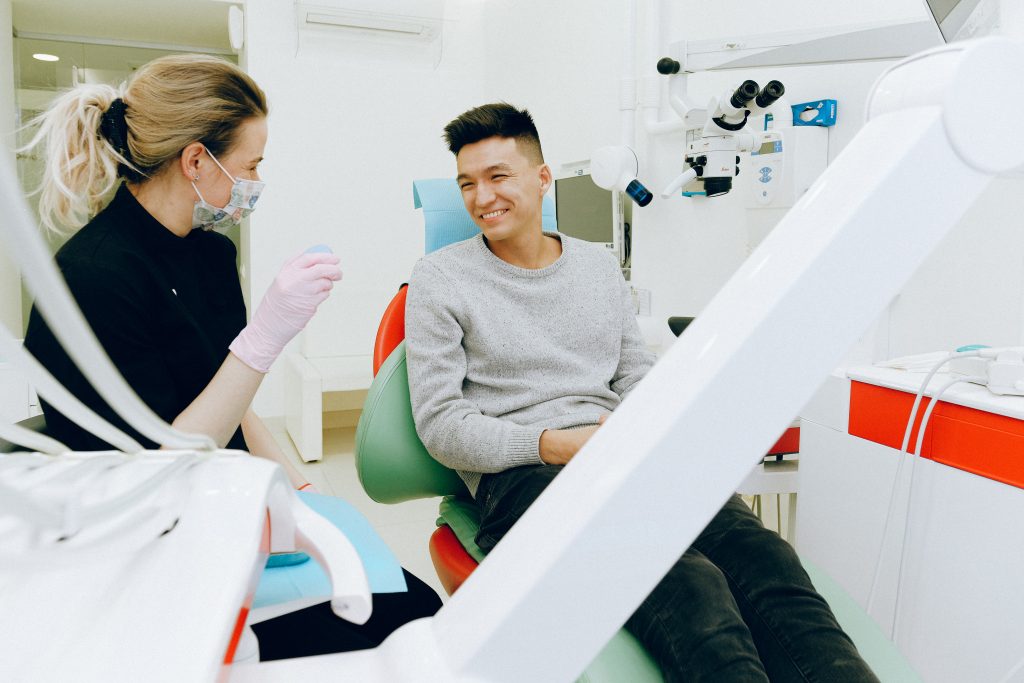Dental Crowns in Whitehouse Station, NJ
Restoring Your Smile and Confidence With Dental Crowns
At Lasting Smiles of Whitehouse Station, we know it’s essential to maintain good oral health for a confident and healthy lifestyle in today’s fast-paced world. We also know dental issues can be a source of discomfort and self-consciousness. Fortunately, Whitehouse Station dentist, Dr. Thomas Gulino has a solution to various dental problems — dental crowns.

What Are Dental Crowns?
Dental crowns, often referred to as caps, are custom-made coverings encasing the entire tooth. They’re designed to restore the tooth’s shape, size, strength, and appearance, enhancing both its functionality and aesthetics.
Benefits of Dental Crowns
Dental crowns offer a range of benefits, making them a versatile and effective solution for various dental concerns.
- Restoring Tooth Functionality: These crowns provide strength and support to weakened or damaged teeth, allowing for normal chewing and biting functions.
- Enhancing Aesthetics: Crowns are custom-made to match the color, shape, and size of your natural teeth, ensuring a seamless and natural appearance.
- Longevity and Durability: With proper care, crowns can provide a long-term solution to dental issues.
- Protection for Weakened Teeth: Crowns help prevent further damage to teeth that have undergone extensive decay or have large fillings.
- Improved Confidence and Self-esteem: A restored and aesthetically pleasing smile can boost confidence, allowing you to feel more comfortable in social situations.
- Versatility in Application: Crowns can be used for various purposes, including cosmetic enhancements, covering dental implants, and addressing structural issues.
- Minimally Invasive Procedure: The process of getting a crown is relatively straightforward and minimally invasive, ensuring a comfortable experience for patients.
- Natural Look and Feel: Modern crowns are designed to closely mimic the look and feel of natural teeth, providing a seamless integration with your existing smile.
Types of Dental Crowns
There are several types of dental crowns, each with its unique characteristics:
- Porcelain-Fused-to-Metal (PFM) Crowns: PFM crowns combine the strength of metal with the natural appearance of porcelain, making them a popular choice for both front and back teeth.
- Ceramic Crowns: Ceramic crowns are known for their remarkable aesthetic appeal, closely mimicking the look and feel of natural teeth. They are an excellent choice for visible front teeth.
- Metal Crowns: These crowns, made from alloys like gold or silver, are incredibly durable and less likely to chip or break. They’re often recommended for molars.
- All-Resin Crowns: These are an economical option, though they tend to wear down over time and are more prone to fractures compared to other types.
When Are Dental Crowns Necessary?
Dental crowns serve various purposes, including:
- Protection of Weakened Teeth: Teeth that have undergone extensive decay or have large dental fillings may benefit from the added support provided by a crown.
- Restoration of Broken or Fractured Teeth: Crowns effectively restore teeth that are chipped, broken, or fractured due to accidents or decay.
- Covering Dental Implants: Crowns are used to cover and protect dental implants, providing a natural-looking replacement for missing teeth.
- Cosmetic Enhancements: They are employed for cosmetic purposes, improving the appearance of teeth with severe discoloration or irregularities.

The Dental Crown Procedure
Consultation and Examination
During the initial consultation, our Whitehouse Station dentist will assess the tooth’s condition, take X-rays, and talk about your goals. From there, we’ll discuss the best type of crown for your specific needs.
Tooth Preparation
Once Dr. Gulino determines you need dental crowns, he’ll begin preparing the tooth. He’ll reshape the tooth to create a suitable base for the crown. From there, he’ll take impressions to ensure a precise fit.
Temporary Crown Placement
While the permanent crown is sent to a dental lab for fabrication, Dr. Gulino will place a temporary crown to protect the prepared tooth.
Crown Placement
Once ready, you’ll return to our Whitehouse Station dental clinic to complete your crown treatment. Dr. Gulino will use dental cement to securely bond the permanent crown.
Aftercare for Your Crowns
Once you’ve undergone the dental crown procedure, it’s essential to follow proper aftercare to ensure the longevity and well-being of your new crowns.
- Maintain Good Oral Hygiene: Continue brushing and flossing regularly to keep your natural teeth and gums healthy. Use non-abrasive toothpaste and a soft-bristle toothbrush to prevent damage to the crown.
- Avoid Chewing on Hard Objects: While dental crowns are durable, they can still be susceptible to damage if subjected to excessive force. Avoid chewing on hard substances like ice or using your teeth as tools.
- Be Mindful of Sticky Foods: Sticky candies or foods can potentially dislodge or damage your crown. Exercise caution when consuming such items, and consider cutting them into smaller, more manageable pieces.
- Attend Regular Dental Checkups: Schedule routine dental check-ups and cleanings to ensure that your crowns are in good condition. Your dentist will assess your fit and overall health during these appointments.
- Address Any Discomfort Promptly: If you experience discomfort, or sensitivity, or notice a change in the fit of your crown, contact your dentist immediately. Early intervention can prevent further complications.
Frequently Asked Questions
Can dental crowns be used for children or adolescents?
Yes, dental crowns can be used for children or adolescents in cases where a baby’s tooth is extensively damaged or for cosmetic reasons. Your dentist will determine the most suitable course of action.
How long do dental crowns typically last?
Dental crowns can last anywhere from five to 15 years, depending on factors such as oral hygiene and the type of crown material. Your dentist will provide care instructions to help you make the most of your crowns.
Is getting a dental crown painful?
The procedure is usually painless, as it’s performed under local anesthesia. Patients may experience some mild discomfort afterward, which can be managed with over-the-counter pain relievers.
Are there any alternatives to dental crowns?
Depending on the specific dental issue, alternatives may include dental veneers, inlays, or onlays. Consult with your dentist to determine the most suitable option for your needs.
Rediscovering Your Smile with Our Crowns
Dental crowns are a remarkable solution for various dental issues, offering both functional and aesthetic benefits. Whether it’s protecting a weakened tooth or enhancing your smile’s appearance, crowns play a crucial role in modern dentistry.
Call our Whitehouse Station, NJ office at (908) 534-4001 to schedule an appointment. You can also request an appointment by clicking the button below. We’re proud to provide services to new and returning patients in the Whitehouse Station area and the surrounding area, including Tweksbury, Branchburg, and Lebanon, NJ. We hope to see you soon!
